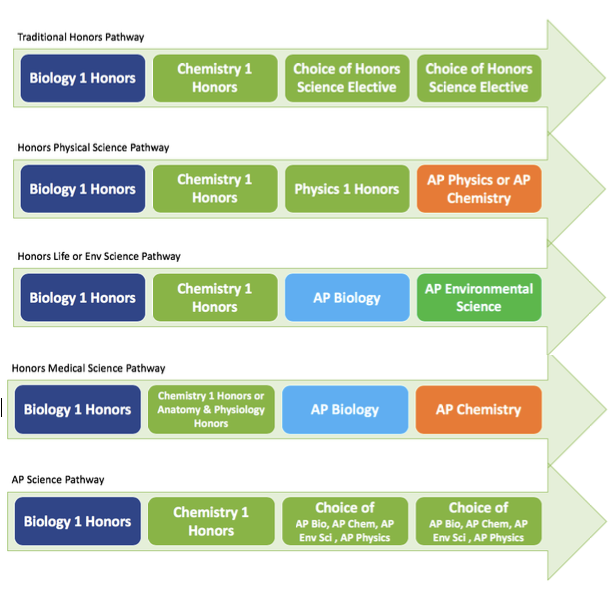Physics 1 Honors (#2003390 )
This course is an equally rigorous science course with a lab component that satisfies part of the science graduation requirement (see below)
3 Credits Science • One of which must be Biology 1, two of which must be equally rigorous science courses • Two of the three required course credits must have a laboratory component • Industry Certifications that lead to college credit may substitute for up to one science credit (except for Biology 1) • An identified computer science** course may substitute for up to one science credit (except for Biology 1)
End of Year District Final - Counts for 10% of Final Course Grade
Students expressing a desire to follow a Physical Science Pathway and have completed Biology.
Advanced Placement Physics
Academic Pathways for Science

Honors Science Electives:
Anatomy & Physiology Honors, Chemistry 1 Honors, Earth & Space Science Honors, Environmental Science, Forensic Science, Genetics Honors, Marine Science, Marine Science 2 Honors, Physics Honors, Any Advanced Placement Science Course
Advanced Placement Science Courses:
AP Biology, AP Chemistry, AP Environmental Science, AP Research (at select schools), AP Physics
Access the Instructional Materials page to see approved instructional resources for this course.
While the content focus of this course is consistent with the Physics I course, students will explore these concepts in greater depth. In general, the academic pace and rigor will be greatly increased for honors level course work. Laboratory investigations that include the use of scientific inquiry, research, measurement, problem solving, laboratory apparatus and technologies, experimental procedures, and safety procedures are an integral part of this course. The National Science Teachers Association (NSTA) recommends that at the high school level, all students should be in the science lab or field, collecting data every week. School laboratory investigations (labs) are defined by the National Research Council (NRC) as an experience in the laboratory, classroom, or the field that provides students with opportunities to interact directly with natural phenomena or with data collected by others using tools, materials, data collection techniques, and models (NRC, 2006, p. 3). Laboratory investigations in the high school classroom should help all students develop a growing understanding of the complexity and ambiguity of empirical work, as well as the skills to calibrate and troubleshoot equipment used to make observations. Learners should understand measurement error; and have the skills to aggregate, interpret, and present the resulting data (National Research Council, 2006, p.77; NSTA, 2007).







